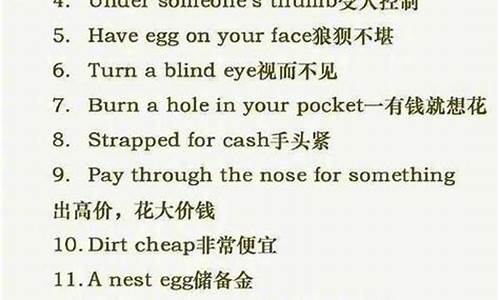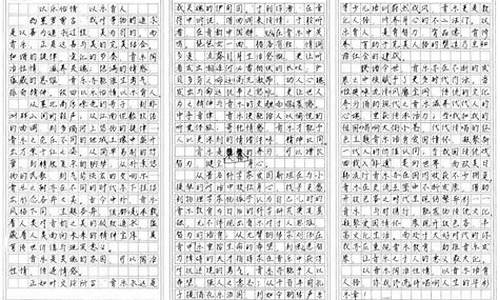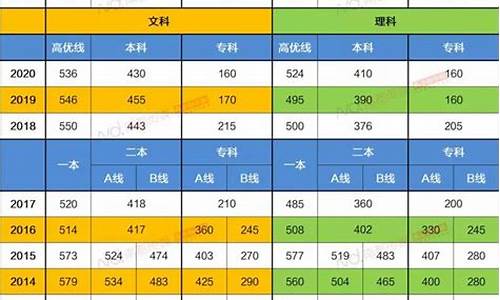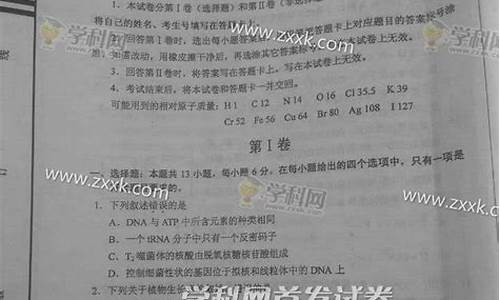您现在的位置是: 首页 > 热门院校 热门院校
英语高考常用语_高考英语常用词组归纳
tamoadmin 2024-05-22 人已围观
简介#英语口语# 导语高考英语其实拿高分很简单,但是需要不断地积累,不断地学会运用,下面是由 无 整理的有关高考英语口语句子合集,一起来了解下吧! 篇一高考英语口语句子 1. That is the reason why I’m not in favour of revising the plan. 这就是我不赞成修正这个计划的原因。 2. His failure was d

#英语口语# 导语高考英语其实拿高分很简单,但是需要不断地积累,不断地学会运用,下面是由 无 整理的有关高考英语口语句子合集,一起来了解下吧!
篇一高考英语口语句子
1. That is the reason why I’m not in favour of revising the plan.
这就是我不赞成修正这个计划的原因。
2. His failure was due to the fact that he had not practised for a long time.
他的失败是由于他没有练习很长时间。
3. It is likely that it will rain in the evening.
可能晚上会下雨。
4. How they went to America is what I want to know.
他们如何到的美国是我想知道的事情。
5. It occurred to him that he had left his key at home.
他突然想起把钥匙落在了家里。
6. The reason why he came late was that he didn’t catch the early bus.
他迟到的原因是他没有赶上早班车。
7. I’m looking forward to the day when Tai Wan returns to China.
我期待着台湾回归祖国的那一天。
8. He sat by the fire, reading a novel.
他坐在火旁,读着一本小说。
9. My dream came true at last.
我的梦想最终实现了。
10. It will not be long before we meet again.
不久之后我们就会再次见面的。
11. The English play in which my students acted at the New Year’s party was a great success.
新年聚会上,学生表演的这部英语剧非常成功。
12. I worked in a business where almost everyone is waiting for a great chance.
我在一家几乎人人都在等好机会的企业里工作。
13. He kept looking at her, wondering whether he had seen her somewhere.
他一直看着她,想知道他是否在某个地方见过她。
14. It is a great honor for Beijing that the 2008 Olympic Games will be held in Beijing.
2008年奥运会将在北京举行对北京来说是一个很大的荣誉。
15. Timmy was fined a large sum of money by the judge for drunken driving.
由于被判定酒驾,Timmy 被罚了一大笔钱。
16. Although he thought he was helping us with the work, he was actually in the way.
尽管他认为是在帮我们,实际上是在碍事。
17. Most hotels have websites where you can find answers to your questions.
大多数旅馆都有你可以找到你问题答案的网站。
18. That most of languages are now threatened and may disappear is a serious matter to the people.
大多数语言受到威胁可能会消失,这对人们来说是件危急的事情。
19. The fact that Great Britain is made up of three countries is still unknown to many people.
很多人仍然不知道英国由三个国家组成。
20. Now that you’ve got a chance, you might as well make full use of it.
既然你有机会,不妨好好利用它。
21. It was only when I reread his poems recently that I begin to appreciate their beauty.
在我重读他诗歌的时候,我才开始领会它们的美。
22. As is reported in the newspapers, talks between the two countries are making progress.
正如报纸上所报道的那样,两国之间的谈话正在取得进展。
23. They came to the conclusion that not all things can be done by a computer.
他们得出结论,不是所有的事情都可以被计算机做。
24. Smoking does great harm to our health.
吸烟对我们的健康造成很大的危害。
25. Only then did he realize his mistakes.
仅仅那个时候他才意识到他的错误。
26. Come and see me whenever you are convenient .
方便的时候来看看我。
27. I thought Jim would say something about his school report , but he didn’t mention it .
我想吉姆会说一些关于他成绩单的事情,但是他没有提。
28. By the end of last year , another new gymnasium had been completed in Beijing.
到去年年底为止,另一个体育馆已经在北京被建成了。
29. when and where to go for the on—salary holiday has not been decided.
带薪休假的时间和地点还没有被决定。
30. I wonder why Jenny hasn’t written us recently. We should have heard from her by now.
我想知道珍妮最近没给我们写信的原因,目前为止我们本应该收到她的来信的。
篇二高考英语口语练习句子
1.Typical of the grassland dwellers of the continent is the American antelope, or pronghorn. 美洲羚羊,或称叉角羚,是该大陆典型的草原动物。
2. Of the millions who saw Haley’s comet in 1986, how many people will live long enough to see it return in the twenty-first century. 1986年看见哈雷慧星的千百万人当中,有多少人能够长寿到足以目睹它在二十一世纪的回归呢?
3. Anthropologists have discovered that fear, happiness, sadness, and surprise are universally reflected in facial expressions.人类学家们已经发现,恐惧,快乐,悲伤和惊奇都会行之于色,这在全人类是共通的。
4. Because of its irritating effect on humans, the use of phenol as a general antiseptic has been largely discontinued. 由于苯酚对人体带有刺激性作用,它基本上已不再被当作常用的防腐剂了。
5. In group to remain in existence, a profit-making organization must, in the long run, produce something consumers consider useful or desirable.任何盈利组织若要生存,最终都必须生产出消费者可用或需要的产品。
6. The greater the population there is in a locality, the greater the need there is for water, transportation, and disposal of refuse. 一个地方的人口越多,其对水,交通和垃圾处理的需求就会越大。
7. It is more difficult to write simply, directly, and effectively than to employ flowery but vague expressions that only obscure one’s meaning. 简明,直接,有力的写作难于花哨,含混而意义模糊的表达。
8. With modern offices becoming more mechanized, designers are attempting to personalize them with warmer, less severe interiors. 随着现代办公室的日益自动化,设计师们正试图利用较为温暖而不太严肃的内部装饰来使其具有亲切感。
9. The difference between libel and slander is that libel is printed while slander is spoken. 诽谤和流言的区别在于前者是书面的,而后者是口头的。
10. The knee is the joints where the thigh bone meets the large bone of the lower leg. 膝盖是大腿骨和小腿胫的连接处。
11. Acids are chemical compounds that, in water solution, have a sharp taste, a corrosive action on metals, and the ability to turn certain blue vegetable dyes red. 酸是一种化合物,它在溶于水时具有强烈的气味和对金属的腐蚀性,并且能够使某些蓝色植物染料变红。
12. Billie Holiday’s reputation as a great jazz-blues singer rests on her ability to give emotional depth to her songs. Billie Holiday’s作为一个爵士布鲁斯乐杰出歌手的名声建立在能够赋予歌曲感情深度的能力。
13. Essentially, a theory is an abstract, symbolic representation of what is conceived to be reality. 理论在本质上是对认识了的现实的一种抽象和符号化的表达。
14. Long before children are able to speak or understand a language, they communicate through facial expressions and by making noises. 儿童在能说或能听懂语言之前,很久就会通过面部表情和靠发出噪声来与人交流了。
15. Thanks to modern irrigation, crops now grow abundantly in areas where once nothing but cacti and sagebrush could live. 受当代灌溉(技术设施)之赐,农作物在原来只有仙人掌和荞属科植物才能生存的地方旺盛的生长。
16. The development of mechanical timepieces spurred the search for more accurate sundials with which to regulate them. 机械计时器的发展促使人们寻求更精确的日晷,以便校准机械计时器。
17. Anthropology is a science in that anthropologists use a rigorous set of methods and techniques to document observations that can be checked by others. 人类学是一门科学,因为人类学家采用一整套强有力的方法和技术来记录观测结果,而这样记录下来的观测结果是供他人核查的。
18. Fungi are important in the process of decay, which returns ingredients to the soil, enhances soil fertility, and decomposes animal debris. 真菌在腐化过程中十分重要,而腐化过程将化学物质回馈于土壤,提高其肥力,并分解动物粪便。
19. When it is struck, a tuning fork produces an almost pure tone, retaining its pitch over a long period of time. 音叉被敲击时,产生几乎纯质的音调,其音量经久不衰。
20. Although pecans are most plentiful in the southeastern part of the United States, they are found as far north as Ohio and Illinois . 虽然美洲山河桃树最集中于美国的东南部但是在北至俄亥俄州及伊利诺州也能看见它们。
篇三高考英语必背句子
1.经济的快速发展 the rapid development of economy
2.人民生活水平的显著提高/ 稳步增长theremarkable improvement/ steady growth of people’sliving standard
3.先进的科学技术 advanced science and technology
4.面临新的机遇和挑战 be faced with new opportunities and challenges
5.人们普遍认为 It is commonly believed/ recognized that…
6.社会发展的必然结果 the inevitable result of social development
7.引起了广泛的公众关注 arouse wide public concern/ draw public attention
8.不可否认 It is undeniable that…/ There is no denying that…
9.热烈的讨论/ 争论 a heated discussion/ debate
10. 有争议性的问题a controversial issue
11.完全不同的观点 a totally different argument
12.一些人 …而另外一些人 … Some people… while others…
13. 就我而言/ 就个人而言 As far as I am concerned, /Personally,
14.就…达到绝对的一致 reach an absolute consensus on…
15.有充分的理由支持 be supported by sound reasons
16.双方的论点 argument on both sides
17.发挥着日益重要的作用 play an increasingly important role in…
18.对…必不可少 be indispensable to …
19.正如谚语所说 As the proverb goes:
20.…也不例外 …be no exception
21.对…产生有利/不利的影响 exertpositive/ negative effects on…
22.利远远大于弊 the advantages far outweigh the disadvantages。
23.导致,引起 lead to/ give rise to/ contribute to/ result in
24.复杂的社会现象 a complicated social phenomenon
25.责任感 / 成就感 sense of responsibility/ sense ofachievement
26. 竞争与合作精神 sense of competition and cooperation
27. 开阔眼界 widen one’s horizon/ broaden one’s vision
28.学习知识和技能 acquire knowledge and skills
29.经济/心理负担 financial burden / psychologicalburden
30.考虑到诸多因素 take many factors into account/ consideration
31. 从另一个角度 from another perspective
32.做出共同努力 make joint efforts
33. 对…有益 be beneficial / conducive to…
34.为社会做贡献 make contributions to the society
35.打下坚实的基础 lay a solid foundation for…
36.综合素质 comprehensive quality
37.无可非议 blameless / beyond reproach
39.致力于/ 投身于 be committed / devoted to…
40. 应当承认 Admittedly,
篇四高考英语作文万能句子
一、开头句子
1.As far as ...is concerned 就……而言
2.It goes without saying that... 不言而喻,...
3.It can be said with certainty that... 可以肯定地说......
4.As the proverb says, 正如谚语所说的,
5.It has to be noticed that... 它必须注意到,...
6.It's generally recognized that... 它普遍认为...
7.It's likely that ... 这可能是因为...
8.It's hardly that... 这是很难的......
9.It's hardly too much to say that... 它几乎没有太多的说...
10.What calls for special attention is that...需要特别注意的是
11.There's no denying the fact that...毫无疑问,无可否认
12.Nothing is more important than the fact that... 没有什么比这更重要的是…
13.what's far more important is that... 更重要的是…
二、衔接句子
1.A case in point is ... 一个典型的例子是...
2.As is often the case...由于通常情况下...
3.As stated in the previous paragraph 如前段所述
4.But the problem is not so simple. Therefore 然而问题并非如此简单,所以……
5.But it's a pity that... 但遗憾的是…
6.For all that...对于这一切...... In spite of the fact that...尽管事实......
7.Further, we hold opinion that... 此外,我们坚持认为,
8.However , the difficulty lies in...然而,困难在于…
9.Similarly, we should pay attention to... 同样,我们要注意...
10.not(that)...but(that)...不是,而是
11.In view of the present station.鉴于目前形势
12.As has been mentioned above...正如上面所提到的…
13.In this respect, we may as well (say) 从这个角度上我们可以说
14.However, we have to look at the other side of the coin, that is... 然而我们还得看到事物的另一方面,即 …
三、结尾句子
1.I will conclude by saying... 最后我要说…
2.Therefore, we have the reason to believe that...因此,我们有理由相信…
3.All things considered,总而言之 It may be safely said that...它可以有把握地说......
4.Therefore, in my opinion, it's more advisable...因此,在我看来,更可取的是…
5.From what has been discussed above, we may safely draw the conclusion that….通过以上讨论,我们可以得出结论…
6.The data/statistics/figures lead us to the conclusion that….通过数据我们得到的结论是,....
7.It can be concluded from the discussion that...从中我们可以得出这样的结论
8.From my point of view, it would be better if...在我看来……也许更好
四、举例句子
1.Let's take...to illustrate this.
2.let's take the above chart as an example to illustrate this.
3. Here is one more example.
4.Take … for example.
5.The same is true of….
6.This offers a typical instance of….
7.We may quote a common example of….
8.Just think of….
五、常用于引言段的句子
1. Some people think that …. 有些人认为…To be frank, I can not agree with their opinion for the reasons below. 坦率地说,我不能同意他们的意见,理由如下。
2. For years, … has been seen as …, but things are quite different now.多年来,……一直被视为……,但今天的情况有很大的不同。
3. I believe the title statement is valid because…. 我认为这个论点是正确的,因为…
4. I cannot entirely agree with the idea that ….我无法完全同意这一观点的… I believe….
5. My argument for this view goes as follows.我对这个问题的看法如下。
6. Along with the development of…, more and more….随着……的发展,越来越多…
7. There is a long-running debate as to whether….有一个长期运行的辩论,是否…
8. It is commonly/generally/widely/ believed /held/accepted/recognized that….它通常是认为…
9. As far as I am concerned, I completely agree with the former/ the latter.就我而言,我完全同意前者/后者。
10. Before giving my opinion, I think it is essential to look at the argument of both sides.在给出我的观点之前,我想有必要看看双方的论据。
六、表示比较和对比的常用句子和表达法
1. A is completely / totally / entirely different from B.
2. A and B are different in some/every way / respect / aspect.
3. A and B differ in….
4. A differs from B in….
5. The difference between A and B is/lies in/exists in….
6. Compared with/In contrast to/Unlike A, B….
7. A…, on the other hand,/in contrast,/while/whereas B….
8. While it is generally believed that A …, I believe B….
9. Despite their similarities, A and B are also different.
10. Both A and B …. However, A…; on the other hand, B….
11. The most striking difference is that A…, while B….
高中英语:高考英语常考60个句型+例句
高中英语入门超级重要的60个句型,附有例句,不爱记语法理论的同学,一定要多背自己不熟悉的句式。
1. as…as?和……一样
中间必须用形容词或副词原级。例如:
This classroom is as big as that one.
这间教室和那间一样大。
He runs as fast as Tom.?
他和汤姆跑的一样快。
否定结构:not as/so…as,“不如……”。上面的两个句子可分别改为:
This classroom is not as/so large as that one.
这间教室不如那间大。
He doesn’t run as/so fast as Tom.
他跑得不如汤姆快。
2. as soon as 一……就……
用来引导时间状语从句。若主句是一般将来时,从句要用一般现在时。例如:
I’ll tell him the plan as soon as I see him.
我一看到他就告诉他这个计划。
He’ll go home as soon as he finishes his work.
他一完成工作就回家。
3. be busy/enjoy/hate/go on/finish doing sth. 忙于/喜欢/讨厌/继续/完成做某事
在enjoy, finish, hate, go on, be busy等词语后,一般用动词-ing形式作宾语。例如:
Lin Tao is busy making a model plane.
林涛正忙着做飞机模型。
My mother enjoys taking a walk after supper.
我妈妈喜欢晚饭后散步。
I hate watching Channel Five.
我讨厌看五频道。
When someone asked him to have a rest, he just went on working.
当有人让他休息一会儿时,他仍继续工作。
I have finished writing the story.
我已经写完了故事。
4. fill…with 用……装满......;be filled with 充满了……;be full of 充满了......
①be filled with 说明由外界事物造成的此种状态,表示被动。例如:
The box is filled with food.
盒子里装满了食物。
②be full of说明主语处于的状态。此外,还可表示程度,意为“非常”。例如:
The patient’s room is full of flowers.
那个病人的房间摆满了花。
The young man is full of pride.
那个年轻人非常骄傲。
③这两种结构还可以相互改写。例如:
I fill the box with food. The box is full of food.
5. be good/bad for 有利于/有害于……
此句型是:be+adj.+for+n.结构。例如:
Doing morning exercises is good for your health.
做早操对你的健康有益。
Always playing computer games is bad for your study.
总玩电脑游戏对你的学习不利。
6. be used to(doing) sth. 习惯于……
后必须接名词或动名词,可用于现在、过去、将来的多种时态。be 可用get,become来代替。例如:
He is used to life in the country.(He is used to living in the country.)
他习惯于乡村生活。
He will get used to getting up early.
他将会习惯于早起。
注意:be used to do 的意思是“被用来做……”。例如:
Wood is used to make paper.
木材被用来造纸。
7. both…and…两者都……
用来连接两个并列成分;当连接两个并列主语时,其后谓语动词用复数。例如:
Both the students and the teachers will go to the History Museum tomorrow.
不论老师还是学生明天都会去历史博物馆。
8. can’t help doing sth. 禁不住做某事
help在此的意思是“抑制,忍住”,其后接动词-ing形式。例如:
His joke is too funny. We can’t help laughing.
他的笑话太有趣了,我们禁不止笑了起来。
9. sth. costs sb. some money 某物花费某人多少钱
此句型的主语是物。cost一词带的是双宾语,它的过去式、过去分词和原型一样。
This book cost me five yuan.
这本书花了我五元钱。
10. either…or… 不是……就是……,或者……或者……
用来连接两个并列成分,当连接并列主语时,谓语动词与邻近的主语保持一致。
You may either stay here or go home.
你可以呆在这儿,也可以回家。
Either she or I am right. = Either I or she is right.
不是她对就是我对。
11. enough (for sb.) to do sth. 足够……做……
在此结构中,for用来引出不定式的逻辑主语。例如:
The ice isn’t thick enough for you to walk on.
这冰还没有厚到你可以在上面走的程度。
12. feel like doing sth. 想要做……
此处like为介词,后面跟动词-ing形式。此句型与would like to do sth.同义。例如:
I feel like drinking a cup of milk.
我想喝一杯牛奶。
13. feel/find/think it adj./n. to do sth. 认为某事……
在此结构中it为形式宾语,不定式短语作真正的宾语。例如:
I find it very interesting to play football.
我发现踢足球很有趣。
She thinks it her duty to help us.
她认为帮助我们是她的职责。
14. get ready for sth./to do sth.
get ready for sth.意为“为某事做准备”;get ready to do sth.意为“准备做某事”例如:
We are getting ready for the meeting.
我们正在为会议做准备。
They were getting ready to have a sports meet at that moment.
他们那时正准备开运动会。
15. get/receive/have a letter from 收到……的来信,相当于hear from
Did you receive a letter from John?
你收到约翰的来信了吗?
I got a letter from my brother yesterday.
我昨天收到了我弟弟的一封来信。
16. had better (not) do sth. 最好(别)做某事
had better为情态动词,其后需用动词原形。had better常用缩写,变成’d better,其否定形式是在其后直接加not。例如:
We had better go now. = We’d better go now.
我们最好现在走吧。
You’d better not go out because it is windy.
今天刮风,你最好别出去了。
17. have sth. done 使(某事)完成 (动作由别人完成)
sth.为宾语,done为过去分词作补语。例如:
We had the machine repaired.
我们请人把机器修好了。
注意区分:We have repaired the machine. 我们(自己)已经修好了机器。
18. help sb. (to) do sth./with sth. 帮助某人(做)某事,其中的to可以省略。例如:
I often help my mother with housework.
我常常帮助妈妈做家务。
Would you please help me (to) look up these words?
请你帮助我查查这些词好吗?
19. How do you like……? 你认为……怎么样?与what do you think of …?同义。例如:
How do you like the weather in Beijing?
你认为北京的天气怎么样? 你觉得这部新**如何?
20. I don’t think/believe that… 我认我/相信……不……
其中的not是对宾语从句进行否定而不是对主句否定(否定前移)。that可省略。例如:
I don’t think it will rain.
我认为天不会下雨。
I don’t believe the girl will come.
我相信那女孩不会来了。
21. It happens that… 碰巧…… 相当于happen to do,例如:
It happened that I heard their secret.
可改写为:I happened to hear their secret
我碰巧听到了他们的秘密。
22. It’s/has been +一段时间+since从句 自从某时起做某件事情已经一段时间了
该句型中since引导的时间状语从句常用一般过去时。例如:
It’s twenty years since he came here.
他来这里已经20年了。
It has been six years since he married Mary.
他和玛丽结婚已经六年了。
23. It is +adj./n. + for sb. to do sth. 做某事对某人来说……
It是形式主语,真正的主语是不定式to do sth。例如:
It’s not easy for us to study English well.
对我们来说学好英语并不容易。
It’s a good idea for us to travel to the south.
去南方旅行对我们来说是个好主意。
24. It’s + adj. + of sb. to do sth.
It是形式主语,to do sth.是真正的主语, 当表语(即形容词)能对逻辑主语描述时,常用介词of,而不用for。例如:
It’s very polite of you to give your seat to old people.
你给老人让座,非常有礼貌。
25. It seems/appears (to sb) that… (在某人看来)好像……
此句中的it是主语,that引导的是表语从句。例如:
It seems that he is lying.?
看样子他好像是在撒谎。
It appears to me that he never smiles.?
在我看来,他从来没有笑过。
26. It is +数词+metres/kilometers long/wide… ……是多少米(公里)长(宽)
用来表示物体的长(宽,高),如数词大于一,名词要用复数。例如:
It is 20 metres long from this end to that end.?
从这端到那端有二十米长。
27. It’s time for sb. to do sth. 是某人干某事的时候了
it是形式主语,真正的主语是动词不定式to do sth. 例如:
It’s time for the child to go to bed.
孩子该睡觉了。
比较下面两种结构:
① It’s time for + n. 例如:
It’s time for school.
②It’s time to do sth. 例如:
It’s time to go to school.
28. It takes sb. some time to do sth. 花费某人多少时间做某事
it是形式主语,真正的主语是动词不定式to do sth。例如:
It takes her fifteen minutes to walk to the bus stop from here.
从这儿走着到公交车站将花费她15分钟。
It took the old man three days to finish the work.
那个老人花了三天时间完成这项工作。
29. keep (on) doing sth. 一直坚持做某事
keep doing sth.一般用于静态动词。keep on doing sth.意为“继续不停地做某事”,一般用于动态动词,但二者的区别并不是很严格,有时可以互换。例如:
Don’t keep on doing such foolish things.
不要再做这样的傻事了。
He kept sitting there all day.
他整天坐在那里。
30. keep…from doing sth. 阻止......做某事
相当于stop…from doing sth., prevent…from doing sth. 在主动句中,stop和prevent后面的from可以省略,但在被动结构中,from不可以省略。例如:
Please keep the children from swimming in the sea.
请别让孩子到海里游泳。
The big noise outside my room stopped me from doing my homework.
屋外巨大的噪音使我不能做作业。
31. keep sb. doing sth. 让某人一直做某事
不可和keep sb.from doing sth.结构混淆。例如:
Why do you keep me waiting for a long time?
你为什么让我等了很长时间?
32. make sb. do sth. 使某人干某事
make意为“使”时,其后要有不带to的动词不定式。例如:
He made me work ten hours a day.?
他让我每天工作10小时。
注意:上句如改为被动语态,则work 前的to不能省略。例如:
I was made to work ten hours a day.
33. neither…nor… 既不……也不……
当连接两个并列主语时,谓语动词与邻近的主语取得一致(就进一致原则)。例如:
Neither we nor Jack knows him.?
我们和杰克都不认识他。
He neither knows nor cares what happened.?
他对发生的事情不闻不问。
34. not…until… 直到……才......
until后可跟名词或从句,表示时间。例如:
He didn’t come until late in the evening.
他直到晚上很迟才来。
He didn’t arrive until the game began.?
直到比赛开始他才来。
35. sb. pays money for sth. 某人花钱买某物
此句型主语是人。例如:
I’ve already paid 2,000 yuan for the motor bike.?
我已经花了2000元买这辆摩托车。
36. spend time/money on sth./(in)doing sth. 花费(时间、钱)在某事上/做某事
其中in可以省略,通常主语为“人”。例如:
I spent five yuan on this book.?
我在这本书上花了五元钱。
I spent two hours (in) doing my homework yesterday.
昨晚我花了两个小时做作业。
37. so…that… 太……以至于……
用于复合句,that引导的是结果状语从句。so是副词,后面应接形容词或副词,如果接名词,应用such。例如:
The ice is so thin that you can’t walk on it.?
冰太薄了,你不能在上面走。
He is such a kind man that we all like him.?
他是一个非常好的人,我们都很喜欢他。
38. stop to do sth., stop doing sth.
stop to do sth. 意为“停下来去做另一件事”,stop doing sth.意为“停止正在做的事”例如:
You’re too tired. You’d better stop to have a rest.?
你们太累了,最好停下来休息一会儿。
The teacher is coming. Let’s stop talking.?
老师来了,咱们别说话了。
39. Thank you for doing sth. 感激你做了……
for之后除了加动名词doing外,还可以加名词。例如:
Thank you for giving me the present.?
谢谢你给我的礼物。
Thank you for your help. =Thank you for helping me.
谢谢你的帮助。
40. thanks to 多亏……,由于……
thanks后的s不能省略,to是介词。例如:
Thanks to my friend Jim, I’ve worked out this problem.?
多亏了我朋友吉姆的帮助,我已经解决了这个问题。
41. There be句型
①在此结构中,there是引导词,在句中不能充当任何成分,也不必翻译出来。句中的主语是某人或某物,谓语动词be要与主语的数保持一致。例如:
There is a man at the door.?
门口有一个人。
当主语是由两个或者两者以上的名词充当时,谓语动词be要跟它邻近的那个名词的数一致(就近一致)。例如:
There are two dogs and a cat under the table.
桌下有两只狗和一只猫。
比较:There is a cat and two dogs under the table.
②There be 句型中的be不能用have来代替,但可以用lie(位于,躺),stand(矗立),exist(生存),live(生活)等词来替换。例如:
There stand a lot of tall buildings on both sides of the street.?
街道两旁矗立着许多高楼。
There lies lake in front of our school.
我们学校前面有一个湖。
Once there lived a king here.?
这儿曾经有一个国王。
There is going to be a sports meeting next week.?
下周准备开一个运动会。
there be 的拓展结构:there seem(s)/happen(s) to be…
There seems to be one mistake in spelling.
似乎有一处拼写错误。
There happened to be a ruler here.?
这儿碰巧有把尺子。
There seemed to be a lot of people there.?
那儿似乎有很多人。
42. The + adj.比较级, the + adj.比较级 越……,越……
此句型表示一方随另一方的变化而变化。例如:
The harder he works, the happier he feels.
他工作越努力,就感到越幸福。
The more, the better.?
多多益善。
43. too+adj./adv. +to do sth. 太……以至于不能…….
此句型为简单句,后面的to表示否定含义。例如:
The ice is too thin for you to walk on.?
这冰太薄,你不能在上面走。
The bag is too heavy to carry.?
这个袋子太重搬不动。
44. used to do sth. 过去常常做某事
used to是情态动词,表示过去的习惯动作或状态,现在已不存在,因此只用于过去时态。例如:
He used to get up early.?
他过去总早起。
When I was yong, I used to play tennis very often.?
我年轻时经常打网球。
否定形式有两种:didn’t use to;used not to,例如:
He didn’t use to come. = He usedn’t to come.?
他过去不常来。
45. what about…? ……怎么样?
后面可接名词、代词、动名词等。与“how about…?”同义。例如:
We have been to Hainan. What about you?
我们去过海南,你呢?
What about going to the park on Sunday?
星期天去公园怎么样?
46. What day/date is it today? 今天星期几(几月几日)?
—What day is it today?
—Sunday.
—What date is it today?
—June 24th.
47. What’s wrong (the matter) with…? ……怎么了?
What’s wrong with you, Madam?
夫人,您怎么了?
You look worried. What’s wrong with you?
你看上去很焦急,出什么事了?
48. Why not do…? 为什么不做……?
谓语动词用原形。与Why don’t you do…?同义。例如:
Why not go to see the film with us?= Why don’t you go to see the film with us?
为什么不和我们一起去看**呢?
49. would like to do sth. 想做……
后用动词不定式作宾语。例如:
I would like to drink a cup of tea.
我想喝一杯茶。
疑问句式:Would you like (to drink) a cup of tea?
你想喝杯茶吗?
50. adj./adv.比较级 + and adj./adv.比较级 越来越......
若形容词/副词为双音节词及多音节词,则这一结构变为“more and more +形容词/副词”。例如:
It’s getting warmer and warmer.?
天气变得越来越暖和了。
The little girl becomes more and more beautiful.?
小女孩变得越来越漂亮了。
51. adj.比较级+than
than引导的是典型的比较级句型,表示“一者比另一者……”,其前用形容词或副词的比较级,than从句可以用省略形式。例如:
I know you better than she does.?
我比她更了解你。
This house is bigger than that one.?
这所房子比那所房子大。
52. though-从句
though引导的是让步状语从句,意思是“虽然……但是……”。但不能和but连用,英语中表达“虽然……,但是……”时,though和but只能用一个。例如:
Though it was snowing, it was not very cold.?
虽然下着雪,可并不太冷。
I was late for the last bus though I hurried.?
虽然我拼命赶路,还是没搭上最后一班公交车。
We didn’t feel tired though we walked a long way.?
虽然我们走了很长的路程,但是并没有感到累。
53. if-从句
If 引导的是条件状语从句,“如果;假如“。如主句用一般将来时,if从句要用一般现在时(主将从现)。例如:
If I go to the Great Wall tomorrow, would you like to come along?
如果明天我去长城,你会和我一起去吗?
If it rains tomorrow, I won’t go.?
如果明天下雨,我就不去了。
54. because-从句
引导原因状语从句,“因为”。例如:
He didn’t hear the knocking at the door because he was listening to the radio.?
他没有听见敲门声,因为他正在听收音机。
55. so + do/be + 主语
“So + be/助动词/情态动词 + 主语” 表示前面所述内容也适用于另一人或物。be、助动词或情态动词的选择视前面陈述句中谓语动词的时态形式而定。例如:
He likes football and so do I.?
他喜欢足球,我也如此。
Jim was playing football just now and so was Tom.?
刚才吉姆在踢足球,汤姆也在踢足球。
比较:“So +主语+be/助动词/情态动词.”结构,是用来证实前一句所表达的内容(起强调作用)。be、助动词或情态动词的选择视前面陈述句中谓语动词的时态形式而定。
A: It is very hot today. 今天天气很热。
B: So it is. 确实如此。
56. not only…but also… 不但……而且……
常用来连接语法作用相同的词、短语或句子。连接两个主语时,谓语动词要和紧靠它的主语在人称和数上保持一致。例如:
She likes not only singing but also dancing.?
她不但喜欢唱歌,而且喜欢跳舞。
He is not only a good doctor but also a good father.?
他不但是个好医生而且是个好爸爸。
Not only I but also he is hoping to go there.?
不但我而且他也想去那儿。
57. prefer…to… 喜欢……胜过…...
prefer (doing) sth. to (doing) sth. 意为“两者相比更喜欢(做)其中之一”。在此结构中,to是介词,接名词或动名词,结构中前后所跟成分一样。例如:
He prefers tea to coffee.?
茶与咖啡相比,他更喜欢茶。
He prefers doing shopping to going fishing.
购物与钓鱼相比,他更喜欢购物。
58. 感叹句型:What (a/an) + adj. + n. +主语+谓语! How + adj./adv.+ +主语+谓语!
What a clever boy (he is)! =How clever the boy is!?
这个男孩儿多聪明啊!
What a wonderful film we saw last night!?
昨天晚上我们看的**多精彩啊!
How lovely the weather is!?
天气多好啊!
How hard he works!?
他工作多么努力啊!
59. 祈使句型
祈使句型表示命令、请求、劝告等含义。说话的对象通常为第二人称,习惯上常省略。句末用句号或感叹号。肯定祈使句是:谓语动词用动词原形表示。否定祈使句是:在谓语动词前加do not(don’t)。例如:
Be here on time tomorrow.?
明天准时到这儿来。
Say it in English!
用英语说!
Don’t be afraid!
别怕!
Don’t look out of the window!
不要朝窗外看!
60. 并列句型
用并列连词连接起来的两个或两个以上的简单句叫并列句。连接并列句常用的连接词有:and, but, or, so, however, not only…but also, neither…nor, either…or…等。例如:
I help her and she helps me.
我帮助她,她帮助我。
He is very old but he is in good health.
他年纪很大了,但他身体很好。
We must hurry, or we’ll be late.
我们得赶快走,不然就晚了。
Kate does her work carefully, so she never makes any mistakes.
凯特工作很认真,从不出错。









